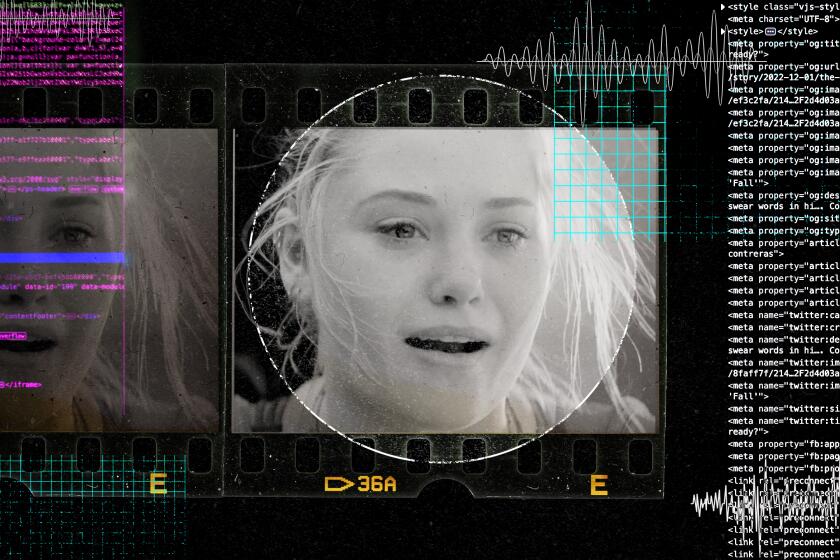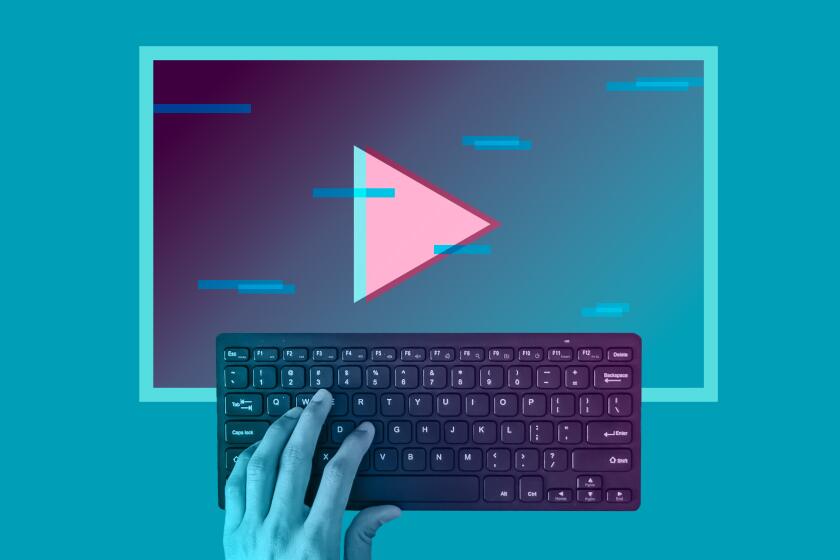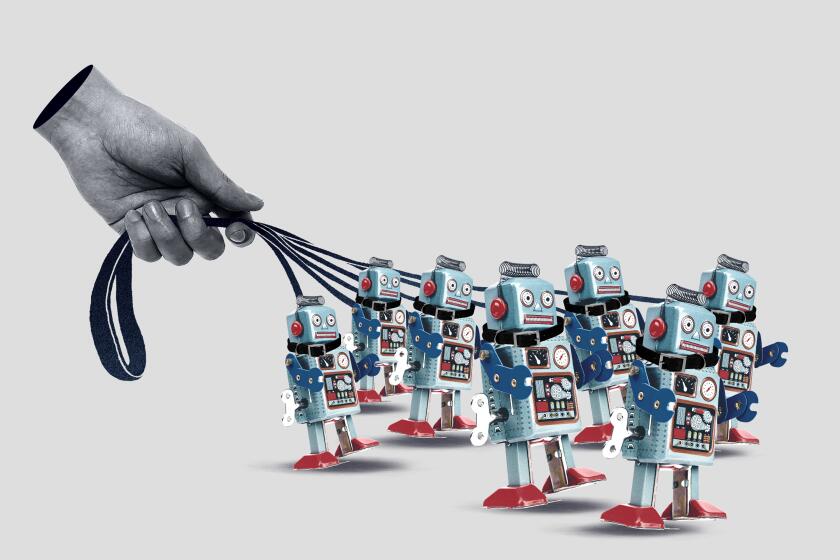AI companies are courting Hollywood. Do they come in peace?

- Share via
Artificial intelligence is coming to Hollywood — but is Hollywood ready for it?
OpenAI, the company behind ChatGPT, is meeting with entertainment industry players, including executives at talent agencies and film studios, to demonstrate and explain its latest technology, Sora, which conjures videos based on what users describe in text.
It’s a delicate dance for entertainment companies that want to harness powerful tools that could reduce costs and streamline their processes. They don’t want to get caught flat-footed at a time when the state of the industry is already tenuous because of pay-TV cord-cutting, streaming losses and other factors. At the same time, they want to avoid offending Hollywood actors, writers and legions of behind-the-scenes workers — such as animators and storyboard artists — who fear AI could kill their jobs.
“Nobody wants to be behind the eight ball,” said Daisy Stall, head of entertainment finance at California Bank & Trust. “If it’s going to be at your doorstep, you got to deal with it, right? It’s still so uncertain and people are just preparing, but they’re not sure the role that it’s actually going to play.”
Director Scott Mann had an issue: too many swear words in his thriller movie. Could artificial intelligence help him get a PG-13 rating?
The looming threat of AI in Hollywood was a key issue in last summer’s dual strikes led by the Writers Guild of America and the Screen Actors Guild-American Federation of Television and Radio Artists.
SAG-AFTRA President Fran Drescher warned last July that if actors don’t stand their ground now, “we are all going to be in jeopardy of being replaced by machines.” The agreements reached that resolved both strikes offered some AI protections. Actors must be asked permission and compensated for the use of their digital likenesses, for example.
But when OpenAI unveiled its text-to-video tool in February, that prompted additional, urgent questions regarding how these innovations would disrupt entertainment production. A user can type in a prompt, such as “a movie trailer featuring the adventures of the 30-year-old space man wearing a red wool knitted motorcycle helmet,” and Sora will create a detailed video that’s up to a minute long.
Entertainment mogul Tyler Perry recently told the Hollywood Reporter he was holding off on an $800-million expansion of his Atlanta studio, saying, “I am very, very concerned that in the near future, a lot of jobs are going to be lost.”
Fran Drescher, Tyler Perry and others are warning about the advances in text-to-video artificial intelligence technology. Producers, executives and artists all need to take proactive steps to protect themselves.
OpenAI said in a statement that it looks forward to an ongoing dialogue with artists and creatives about Sora, some of whom it has already worked with as the technology remains in its testing stage before its wider release.
“OpenAI has a deliberate strategy of working in collaboration with industry through a process of iterative deployment — rolling out AI advances in phases — in order to ensure safe implementation and to give people an idea of what’s on the horizon,” the company said in a statement. “We’re sharing our research progress with Sora early to gain feedback on how to advance the model to be most helpful for creative professionals.”
The company’s meetings were first reported by Bloomberg.
Though Sora is impressive, people who’ve seen demos say, it is still in its early days. OpenAI has not yet determined how it will make money from the product, according to people briefed on the company’s plans who were not authorized to comment.
There also remain sticky questions about how OpenAI handles copyrighted work in its training data. The company has said its large language models, including those that power ChatGPT, are developed through information available publicly on the internet, material via licenses with third parties, and information its users and “human trainers” provide.
The company said in a blog post that it believes training AI models on publicly available materials on the internet is “fair use.” “We view this principle as fair to creators, necessary for innovators, and critical for US competitiveness,” OpenAI said in a blog post in January.
Sora is not currently available to the public, but OpenAI has made the technology accessible to some creators, including director Paul Trillo, who said the technological advances have let him test bold ideas, without being restricted by time and money.
“There is going to be like a seismic shift and people just need to start to embrace these kinds of aspects of how we’re going to make images in the future,” Trillo said. “We can all learn to adapt together.”
The entertainment sector is already using some AI technologies. A film distributed by Lionsgate used AI software to put altered dialogue in a movie without having to re-shoot the scene. Spotify is using voice translation software powered by AI to interpret podcasts into different languages using the speaker’s voice. Social media influencers are using chatbots to engage with their fans.
Other AI-related companies are collaborating with entertainers — for example, Facebook owner Meta in September announced it worked with celebrities to create new characters powered by AI that would chat with users.
Century City-based talent agency CAA launched the Vault last year for its clients, which scans clients’ bodies and records their movements and voices to create a digital version of them. Those who wish to participate will be able to create and own their own digital likenesses, which the agency believes will help protect those clients against copyright infringement and allow talent to make more money.
“It’s so easy to bury heads in the sand on this sort of stuff, but our view was, we are not going to be able to stop this train,” said Alexandra Shannon, CAA’s head of strategic development. “We can’t stand in the way of innovation. It has never been a proven successful model, and so we leaned into it.”
Under the terms of the WGA’s new contract, AI is here to stay — with limits.
Shannon said potential benefits of AI include making work more efficient and creating additional commercial opportunities for artists and performers. Music artists including ABBA have launched concerts with digital versions of themselves and music artist Lauv used AI to create a Korean-language version of his song “Love U Like That” for fans last year.
“From where we sit, we very much view these as technologies that can further enhance the work of people and of what they’re doing today,” Shannon said.
Some in Hollywood are eager to learn more about the coming automated future. Entertainment mogul and tech investor Jeffrey Katzenberg took a group of movie, TV and music pros with him to AI chipmaker Nvidia’s developer conference in San Jose this month and watched a two-hour keynote presentation by Chief Executive Jensen Huang.
“AI is going to be an essential tool for all forms of storytelling and most especially Hollywood,” Katzenberg said in an email. “Learning about it from one of the true visionary leaders was invaluable. I know everyone of us was super impressed with what we saw.”
A new study estimates that 62,000 entertainment jobs in California will be disrupted by artificial intelligence in the next three years.
Caleb Ward and his wife, Shelby, started an AI filmmaking course at their Burbank online training school, Curious Refuge, in June. It’s about to start its 10th session in April. People have gone through their courses from all types of professions, including a dentist who switched careers to filmmaking.
“I think it’s natural to be fearful of change and the truth is, AI is going to dramatically change the way that we tell stories,” Ward said.
Director, writer and producer Bernie Su said that he recently used AI tools to help present his concept for a commercial, indicating what types of shots he wanted to take. Without the tools, he would have had to use stock photos, which wouldn’t have conveyed his ideas as well, he said.
“It helps to save time and it also was able to clear communication from vision to vision as well,” said Su, who is also a strategic advisor and investor in AI tool Sudowrite, which he has used to spark ideas as a writer.
While the tech industry has been roiled by layoffs, the greater focus on AI could lead to new jobs in the future.
Su cautioned that there remain significant limitations in today’s AI text-to-video tools, including continuity problems. And they can’t yet make a full, convincing narrative movie with multiple locations and sequences. “We’re not there yet,” Su said.
















